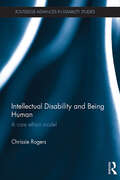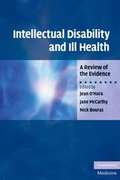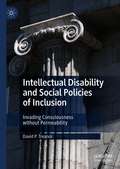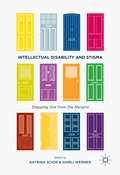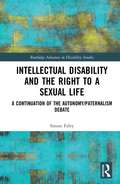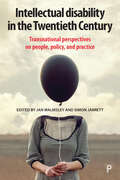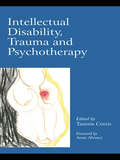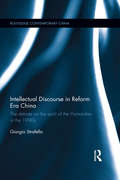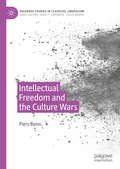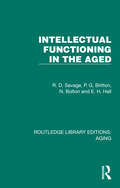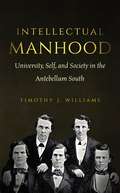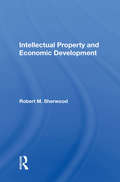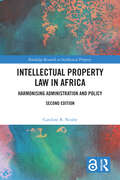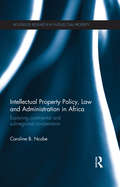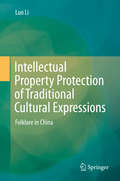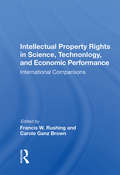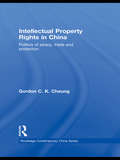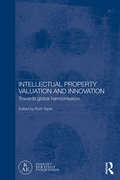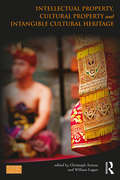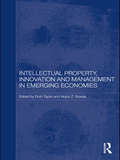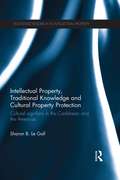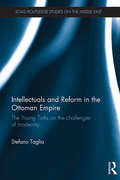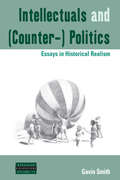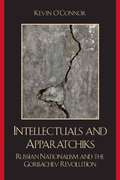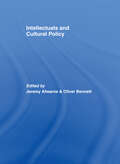- Table View
- List View
Intellectual Disability and Being Human: A Care Ethics Model (Routledge Advances in Disability Studies)
by Chrissie RogersIntellectual disability is often overlooked within mainstream disability studies, and theories developed about disability and physical impairment may not always be appropriate when thinking about intellectual (or learning) disability. This pioneering book, in considering intellectually disabled people's lives, sets out a care ethics model of disability that outlines the emotional caring sphere, where love and care are psycho-socially questioned, the practical caring sphere, where day-to-day care is carried out, and the socio-political caring sphere, where social intolerance and aversion to difficult differences are addressed. It does so by discussing issue-based everyday life, such as family, relationships, media representations and education, in an evocative and creative manner. This book draws from an understanding of how intellectual disability is represented in all forms of media, a feminist ethics of care, and capabilities, as well as other theories, to provide a critique and alternative to the social model of disability as well as illuminate care-less spaces that inhabit all the caring spheres. The first two chapters of the book provide an overview of intellectual disability, the debates surrounding disability, and outline the model. Having begun to develop an innovative theoretical framework for understanding intellectual disability and being human, the book then moves onto empirical and narrative driven issue-based chapters. The following chapters build on the emergent framework and discuss the application of particular theories in three different substantive areas: education, mothering and sexual politics. The concluding remarks draw together the common themes across the applied chapters and link them to the overarching theoretical framework. An important read for all those studying and researching intellectual or learning disability, this book will be an essential resource in sociology, philosophy, criminology (law), social work, education and nursing in particular.
Intellectual Disability and Ill Health
by Jean O'Hara Jane Mccarthy Nick BourasPeople with intellectual disability often have health needs that go unrecognised and untreated; this may be because of difficulties in communication, diagnostic overshadowing, discrimination or indifference. There is concern that public health measures aimed at reducing the main health killers in the population will not address these issues for people with intellectual disability and may preferentially widen the inequality that already exists. This book is a comprehensive and systematic review of physical and mental health co-morbidities in people with intellectual disability. Such an evidence base is vital in shaping public health policy, healthcare commissioning and the development of more effective healthcare systems, as well as supporting better understanding and practice at an individual clinical level. This is essential reading for policy makers and commissioners of services, as well as individual practitioners across mainstream and specialist health and social care, in considering not only service developments but practice at the coalface.
Intellectual Disability and Social Policies of Inclusion: Invading Consciousness without Permeability
by David P. TreanorThis book explores why, after forty years of funded policies of social inclusion, persons living with an intellectual disability are still separated from the social fabric of neoliberal societies. David Treanor shows how the nature of the reform process is driven unnecessarily by the economic neoliberal paradigm, the cultural misconceptions of intellectual disability, and the inattention accorded to personal relationships between persons living with and without an intellectual disability. Treanor utilizes John Macmurray’s personalist philosophy, Julia Kristeva’s ontology of disability and Michele Foucault’s concept of bio-power to explain this phenomenon. The concepts in this book challenge current approaches to social inclusion and have radical implications for future practices.
Intellectual Disability and Stigma
by Katrina Scior Shirli WernerThis book examines how intellectual disability is affected by stigma and how this stigma has developed. Around two per cent of the world's population have an intellectual disability but their low visibility in many places bears witness to their continuing exclusion from society. This prejudice has an impact on the family of those with an intellectual disability as well as the individual themselves and affects the well-being and life chances of all those involved. This book provides a framework for tackling intellectual disability stigma in institutional processes, media representations and other, less overt, settings. It also highlights the anti-stigma interventions which are already in place and the central role that self-advocacy must play.
Intellectual Disability and the Right to a Sexual Life: A Continuation of the Autonomy/Paternalism Debate (Routledge Advances in Disability Studies)
by Simon FoleyOne of the perennial political/philosophical questions concerns whether it is ever justifiable for a third party to paternalistically restrict an adult’s freedom to ensure their own, or society’s, best interests are protected. Wherever one stands on this debate it remains the case that, unlike their non-impaired contemporaries, many intellectually disabled adults are subjected to a paternalistic regime of care. This is particularly the case regarding members of this population exercising more control of their sexuality. Utilizing rare empirical data, Foucault's theory of power and Kristeva’s concept of abjection, this work shows that many non-disabled people – including family members – hold ambivalent attitudes towards people with visible disabilities expressing their sexuality. Through a careful examination of the autonomy/paternalism debate this is the first book to provide an original, provocative and philosophically compelling analysis to argue that where necessary, facilitated sex with prostitutes should be included as part of a new regime of care to ensure that sexual needs are met. Intellectual Disability and the Right to a Sexual Life is essential reading for scholars, students and policy-makers with an interest in philosophy, sociology, political theory, social work, disability studies and sex studies. It will also be of interest to anybody who is a parent or a sibling of an adult with an intellectual disability and those with an interest in human rights and disability more generally.
Intellectual Disability in the Twentieth Century: Transnational Perspectives on People, Policy, and Practice
by Jan Walmsley and Simon JarrettWith contributions from distinguished authors in 14 countries across 5 continents, this book provides a unique transnational perspective on intellectual disability in the twentieth century. Each chapter outlines different policies and practices, and details real-life accounts from those living with intellectual disabilities to illustrate their impact of policies and practices on these people and their families. Bringing together accounts of how intellectual disability was viewed, managed and experienced in countries across the globe, the book examines the origins and nature of contemporary attitudes, policy and practice and sheds light on the challenges of implementing the UN Convention on the Rights of Persons with Disabilities (UNCPRD).
Intellectual Disability, Trauma and Psychotherapy
by Tamsin CottisPeople with intellectual disabilities have emotional and mental health needs just like anyone else. Until recently however there has been little research of effective psychological treatment or direct, accessible psychotherapy provision for this client group. Intellectual Disability, Trauma and Psychotherapy focuses on the delivery of psychotherapy services for those with intellectual disabilities. Leading professionals in this specialist field are brought together to describe the history, theory and practice of their work in twelve focused chapters that draw on the work of psychotherapists including Bion, Winnicott, Sinason and Alvarez. Topics covered include: therapeutic responses to cultural and religious diversity support for parents with intellectual disabilities developing healthy and secure attachments within the family dealing with intense feelings of shame helping clients to cope with traumatic sexual experiences. Drawing on over a decade of pioneering practitioner experience at Respond – a government-funded psychotherapy service for people with learning disabilities based in central London – this book explores the practical issues in providing therapy to this client group, whether individually, in families, in groups, or by the use of telephone counselling. It closes with a chapter exploring the way forward for those who wish to develop services of this kind.
Intellectual Discourse in Reform Era China: The Debate on the Spirit of the Humanities in the 1990s (Routledge Contemporary China Series)
by Giorgio StrafellaThis book explores intellectual discourse in reform era China by analysing the so-called “debate on the spirit of the Humanities”, which occurred in the years 1993-95, and which is recognised by scholars as one of the most interesting, influential and important debates of the 1990s. This debate, in which Chinese intellectuals reflected on reform-era mass culture and on their role in society, was the first debate in China after the crackdown of 1989 and the launch of new economic reforms after Deng Xiaoping’s 1992 “southern tour”. The book, drawing on a large corpus of texts and a wide range of individual positions, demonstrates how Chinese intellectuals, having to face the combination of political repression and economic liberalisation, conceptualised and reacted to both. The book reveals the scale and complexity of the debate, the nature of intellectual life in China, the status and relevance of intellectual voices in society, the divisions within the intellectual sphere as well as shared concepts and ideals, and how the key factors of political repression and economic liberalisation which remain central in China today were defined and articulated.
Intellectual Freedom and the Culture Wars (Palgrave Studies in Classical Liberalism)
by Piers BennThis book offers a sustained and vigorous defence of free expression and objective enquiry situated in the context of the current culture wars. In the spirit of J. S. Mill, Benn investigates objections to the ideal of free expression in relation to harm and offence, reaching broadly liberal conclusions with reference to recent examples of attempts to curb free speech on university campuses. Accepting that some expressions can cause non-physical harm, Benn also considers objections to free speech based on certain understandings of power and privilege. In its exploration and rejection of arguments against the possibility of obtaining objective truth, the book navigates hotly contested fields of contemporary debate, including feminism and identity politics. It challenges the dogma of social constructionism and examines current notions of identity, arguing that a case for fairness can be made without appealing to them. Offering a qualified endorsement of friendship between ideological opponents, Benn highlights common obstacles to civil and rational discussions, concluding with a rational, moral, and broadly spiritual solution to the cultural combat that monopolises present-day society.
Intellectual Functioning in the Aged (Routledge Library Editions: Aging)
by R. D. Savage P. G. Britton N. Bolton E.H. HallBy the early 1970s the psychology of age had become an extremely important topic in the field. In the present book, originally published in 1973, the authors are particularly concerned with the subject of intellectual functioning. The assessment of intellect in the aged has many important theoretical and practical implications. At the same time, this work was of vital importance to the problems of medical illness in the aged, particularly with psychiatric and neurological diagnosis. Intellectual functioning is severely affected by psychiatric illness – but the intellectual difficulties associated with functional disorder in the aged may be quite different from those in the young. The cross-fertilization of psychiatric and psychological work on problems of the aged at the time left much to be desired. It was the hope of the present book to contribute towards a much firmer amalgamation of the two attitudes.The book would have been of general interest to psychologists interested in cognitive assessment, to those concerned with the developmental aspects of intellectual functioning and also to clinical psychologists and social welfare workers with particular responsibility for the aged. Today it can be read in its historical context.
Intellectual Manhood
by Timothy J. WilliamsIn this in-depth and detailed history, Timothy J. Williams reveals that antebellum southern higher education did more than train future secessionists and proslavery ideologues. It also fostered a growing world of intellectualism flexible enough to marry the era's middle-class value system to the honor-bound worldview of the southern gentry. By focusing on the students' perspective and drawing from a rich trove of their letters, diaries, essays, speeches, and memoirs, Williams narrates the under examined story of education and manhood at the University of North Carolina, the nation's first public university.Every aspect of student life is considered, from the formal classroom and the vibrant curriculum of private literary societies to students' personal relationships with each other, their families, young women, and college slaves. In each of these areas, Williams sheds new light on the cultural and intellectual history of young southern men, and in the process dispels commonly held misunderstandings of southern history. Williams's fresh perspective reveals that students of this era produced a distinctly southern form of intellectual masculinity and maturity that laid the foundation for the formulation of the post-Civil War South.
Intellectual Property And Economic Development
by Robert M SherwoodSpeaking very roughly, countries with advanced economies tend to be those displaying intellectual property protection systems in which the public has a basic degree of confidence. Those systems, when they are thought about at all rather than taken for granted, are thought of as reasonably effective in safeguarding innovation and creative expression
Intellectual Property Law in Africa: Harmonising Administration and Policy (Routledge Research in Intellectual Property)
by Caroline B. NcubeExamining the harmonisation of Intellectual Property policy, law and administration in Africa, this book evaluates the effectiveness of efforts to establish continental Intellectual Property institutions and frameworks. It also considers sub-regional initiatives led by the regional economic communities and the regional Intellectual Property organisations, focusing on relevant protocols and agreements that address Intellectual Property as well as the implementing institutions. The book assesses the progress of such initiatives with particular reference to the current socio-economic status of African states. It argues that that harmonisation initiatives need to be crafted in a way that is supportive of the developmental goals of African states and advocates for due consideration of individual states’ unique conditions and aspirations. This book will be of great relevance to scholars and policy makers with an interest in Intellectual Property law and its harmonisation in Africa.
Intellectual Property Policy, Law and Administration in Africa: Exploring Continental and Sub-regional Co-operation (Routledge Research in Intellectual Property)
by Caroline B. NcubeThis book examines the harmonisation of Intellectual Property (IP) policy, law and administration in Africa. Two recent developments have brought this topic to the fore. The first is the escalation of long-standing efforts to establish a Pan-African Intellectual Property Organisation (PAIPO), a continental initiative. The second is the current sub-regional attempt to operationalise the IP provisions of the Southern African Development Community (SADC)’s Protocol on Trade (articles 9b and 24) and its Protocol on Science, Technology and Innovation (article 2m). Intellectual Property Policy, Law and Administration in Africa discusses the viability of such initiatives with particular reference to the current socio-economic status of Africa’s nations. With a view to contributing to future developments in Africa at both a continental and sub-regional level, the author considers this issue through the lens of advancing the public interest in IP. Ncube argues that harmonisation initiatives ought to be crafted in a way that is supportive of the development aspirations of African states. Consequently, she urges due consideration of individual states’ unique conditions and aspirations in any harmonisation venture, a necessity outlined in article 7 of the Agreement on Trade Related Aspects of Intellectual Property Rights. This book will be of great relevance to scholars and policy makers with an interest in IP law and African law in general.
Intellectual Property Protection of Traditional Cultural Expressions
by Luo LiThe work reviews issues concerning the protection of folklore through the intellectual property legal system, then explores two main issues in the protection of Chinese folklore. The first issue is the influence of Chinese traditional culture on the Chinese intellectual property legal system and Chinese society. The second concerns the deficiencies of the Chinese intellectual property system with regard to folklore. Both issues are examined through a survey on the weak public recognition of intellectual property law and folklore in Chinese society. The book also reveals the practical issues that have arisen in Southwest China through case studies. After analysing these issues, the work designs a model law specifically for folklore and also provides suggestions for how the current intellectual property legal system could establish a comprehensive legal protection system for folklore. Furthermore, the work shows that its proposed model law is effective in practice by resolving the issues in the case studies presented.
Intellectual Property Rights In Science, Technology, And Economic Performance: International Comparisons
by Francis W. Rushing Carole Ganz BrownThis book discusses the economic, political, legal, and social concerns of the world's governments on intellectual property rights. It analyzes the systems of both developed and developing economies and draws a clear picture of the status of intellectual property regimes around the world.
Intellectual Property Rights in China: Politics of Piracy, Trade and Protection (Routledge Contemporary China Series)
by Gordon C.K CheungIntellectual Property Rights (IPR) infringement is so rampant in China that counterfeit goods - from general household merchandise, garments and media consumables to specialist products including pharmaceutical products and super computer chips - can be found in roadside stalls, markets, shops, department stores and even laboratory of leading universities. If allowed to continue these infringements may further engender a socially accepted culture of ‘fakeness’ that may seriously hamper innovation and economic progress. Gordon C. K. Cheung uses the case of intellectual property rights (IPR) to examine how and to what extent market forces and knowledge development affect the relationships of China and the world, especially the United States. Including detailed original statistics and data collected from Chinese provinces and cities and in-depth interviews with legal experts and policy makers, this book gives a unique insight into the opportunities and challenges that China faces as it increasingly becomes part of the global society. Intellectual Property Rights in China is a stimulating read for anyone studying Chinese Business and International Political Economy.
Intellectual Property Valuation and Innovation: Towards global harmonisation (Routledge Studies in the Growth Economies of Asia)
by Ruth TaplinWith the recent global economic crisis, attitudes and practices in relation to intellectual property valuation are changing as exemplified by the dichotomy explained in this book, which makes it unique. While there has been a move towards global harmonisation in terms of valuation of both tangible and intangible assets that are based on innovation, there is also a tendency against global harmonisation because of cultural attitudes and practices of different countries. This can be seen most acutely in relation to intellectual property valuation in Asia, especially East Asia, which often differs from the West’s perception of valuation. The book is written by experts in intellectual property, valuation and innovation who are mainly practitioners covering innovators, marketers, accountants, social innovators and business and management academics. The breadth and practitioner background of most of the contributors make the material relevant to those involved in valuation, economics, business, management, accounting and finance, law and maritime insurance. This book takes an interdisciplinary approach that cross-cuts all the above-mentioned disciplines and takes the understanding of intellectual property valuation to a new level.
Intellectual Property, Cultural Property and Intangible Cultural Heritage (Key Issues in Cultural Heritage)
by William Logan Christoph AntonsIntellectual Property, Cultural Property and Intangible Cultural Heritage examines various notions of property in relation to intangible cultural heritage and discusses how these ideas are employed in rights discourses by governments and indigenous and local communities around the world. There is a strong historical dimension to the book’s exploration of the interconnection between intellectual and cultural property, intangible cultural heritage and indigenous rights discourses. UNESCO conventions, discussions in the World Intellectual Property Organization (WIPO), the Convention on Biological Diversity and the recent emphasis on intangible cultural heritage have provided various discourses and models. The volume explores these developments, as well as recent cases of conflicts and cross-border disputes about heritage, using case studies from Asia, Europe and Australia to scrutinize the key issues. Intellectual Property, Cultural Property and Intangible Cultural Heritage will be essential reading for scholars and students engaged in the study of heritage, law, history, anthropology and cultural studies.
Intellectual Property, Innovation and Management in Emerging Economies (Routledge Studies in the Growth Economies of Asia)
by Ruth TaplinThis book argues that intellectual property (IP) management development and innovation are fundamental to economic development , especially in newly emerging economies which often hold vast reserves of natural resources and human knowledge that remain unprotected. It sheds light on countries that are gradually realising this situation, with examples from many parts of the world, including Eastern Europe, Africa and especially Asia including India, where a great deal is being made of innovation and intellectual property to stimulate economic growth. These case studies are seen within the theoretical context of the future of cross-border IP which is slowly becoming a reality. Specific examples go beyond the patent prosecution highway, to which China has also recently signed up, and India’s development of generic drugs at lower costs. Experts in the field including practising IP lawyers explain and criticise current and new models being tested in emerging economies concerning IPR. Original case studies of hitherto little understood breaches of African trademarks by the US and Japan, and patenting mistakes in relation to little known Indian forest plants all damage emerging economies and their native people's lives. While proper implementation of IP laws by emerging economies themselves can lead to positive outcomes for all involved, the key is an independent judiciary coupled by thoughtful and thoroughly understood implementation of IP laws within the context of cross border IP. The book shows through models how different emerging economies are at various levels of developing their IPR and what paths they are taking to do this. Finally, it provides a comprehensive assessment of the ways in which innovation, protection and enforcement of IP laws can help newly emerging economies achieve economic growth without destroying natural and human resources, while moving ahead from the current global financial crisis.
Intellectual Property, Traditional Knowledge and Cultural Property Protection: Cultural Signifiers in the Caribbean and the Americas (Routledge Research in Intellectual Property)
by Sharon B. Le GallInternational developments since the mid-1990s have signalled an awareness of the importance and validity of traditional knowledge and cultural property. The adoption of the Convention on Biological Diversity, and the establishment of the WIPO Intergovernmental Committee on Intellectual Property and Genetic Resources, Traditional Knowledge and Folklore demonstrate an emerging trend towards the recognition of the rights of communities and the importance of culture in shaping international law and policy. This book examines how developments to protect collectively held knowledge transpose to circumstances which may not meet the usually understood criteria of what is considered to be an indigenous or traditional group. This includes communally derived cultural products which have emerged out of communities and subsequently formed a part of the national or popular culture. The book considers the steel pan of Trinidad and Tobago, punta rock music from Belize, Brazilian capoeira, and the cajón of Peru as key cases studies of this. By exploring the impact of past and recent international developments to protect traditional knowledge, Sharon Le Gall highlights a category of cultural signifiers which lies outside the scope of intellectual property protection, as well as the protection proposed for traditional knowledge and advocated for intangible cultural property. The book proposes a reinterpretation of Joseph Raz’s interest theory of group rights in order to accommodate the rights advocated for collectively derived cultural signifiers on the basis of their value as symbols of identity. In doing so, Le Gall offers an original account of how those signifiers, which may not be described as exclusively ‘traditional’ or ‘indigenous’ and held in ways which are not ‘traditional’ or ‘customary’, may be accommodated in emerging traditional knowledge laws.
Intellectuals and Reform in the Ottoman Empire: The Young Turks on the Challenges of Modernity (SOAS/Routledge Studies on the Middle East)
by Stefano TagliaThis book uncovers Young Turk political and social ideas at the end of the nineteenth century, during the intellectual phase of the movement. Analysing the life in exile of two of the most charismatic leaders of the Young Turk movement, Ahmed Rıza and Mehmet Sabahattin, the book unravels their plans for the future of the Ottoman Empire, covering issues of power, religion, citizenship, minority rights, the role of the West, and the accountability of the Sultan. The book follows Rıza and Sabahattin through their association with philosophical circles, and highlights how their emphasis on intellectualism and elitism had a twofold effect. On the one hand, seeing themselves as enlightened and entrusted with a mission, they engaged in enduring debates, leaving an important legacy for both Ottoman and Republican rule. On the other hand, the rigidity resulting from elitism and intellectualism prevented the conception of concrete plans for change, causing a schism at the 1902 Congress of Ottoman Liberals and marking the end of the intellectual phase. Using bilingual period journals, contemporary accounts, police archives and political and philosophical treaties, this book is of interest to students, scholars and researchers of Middle East and Ottoman History, and Political Science more broadly.
Intellectuals and (Counter-) Politics: Essays in Historical Realism
by Gavin SmithContemporary forms of capitalism and the state require close analytic attention to reveal the conditions of possibility for effective counter-politics. On the other hand the practice of collective politics needs to be studied through historical ethnography if we are to understand what might make people's actions effective. This book suggests a research agenda designed to maximize the political leverage of ordinary people faced with ever more remote states and technologies that make capitalism increasingly rapacious. Gavin Smith opens and closes this series of interlinked essays by proposing a concise framework for untangling what he calls "the society of capital" and subsequently a potentially controversial way of seeing its contemporary features. This book tackles the political conundrums of our times and asks what roles intellectuals might play therein.
Intellectuals and Apparatchiks: Russian Nationalism and the Gorbachev Revolution
by Kevin O'ConnorThis book traces the origins and activities of an alliance of conservative Communist Party authorities and Russian nationalists during the late Soviet era. Specifically, it examines how and to what extent hitherto orthodox Communists sought political allies in the Russian nationalist movement in order to garner support for halting the reform program and saving the Soviet state from collapse. Focusing on the perestroika period, Dr. Kevin O'Connor explains in detail how Marxism-Leninsim receded into irrelevance, forcing orthodox Communists to abandon their Marxist principles in favor of great Russian nationalism.
Intellectuals and Cultural Policy
by Jeremy Ahearne & Oliver BennettIntellectuals and policy analysts might appear to inhabit two different worlds. Intellectuals aspire to articulate issues of universal concern; policy analysts attend to the detail of specific measures and programmes. How far do these common assumptions match up to reality? What happens when intellectuals engage with cultural institutions and the m
